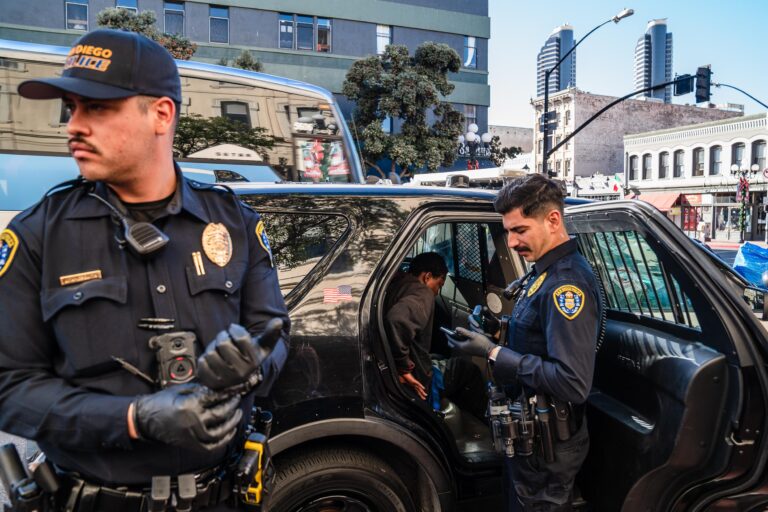San Diego County Police Convictions Reveal Deep-Seated Issues in Law Enforcement
Widespread Criminal Convictions Among San Diego Law Enforcement Officers
Recent disclosures have uncovered a disturbing trend of criminal behavior among police officers throughout San Diego County. Over the last half-decade, more than 40 law enforcement officials have been found guilty of offenses including corruption, drug-related crimes, evidence manipulation, and excessive force. These findings have ignited urgent discussions about the need for comprehensive reforms and enhanced transparency within local policing agencies.
The table below outlines the distribution of convictions by department and the prevalent charges associated with each:
| Police Department | Number of Convicted Officers | Frequent Offenses |
|---|---|---|
| San Diego Police Department | 18 | Corruption, Drug Possession |
| Chula Vista Police Department | 9 | Excessive Force, Evidence Tampering |
| Oceanside Police Department | 7 | Bribery, Misconduct |
| Escondido Police Department | 6 | Drug Use, Assault |
- The majority of these convictions stem from abuses of authority and illegal acts committed while on duty.
- Community advocates stress the critical role of oversight committees in rebuilding public confidence.
- Legal analysts caution that similar misconduct patterns may be present in other regional law enforcement bodies.
How Officer Misconduct Undermines Public Safety and Community Relations
The exposure of numerous criminal convictions among San Diego County officers has significantly damaged the fragile trust between police forces and the communities they serve. These incidents not only reveal individual lapses but also tarnish the reputation of entire departments. Reestablishing community trust is a formidable challenge, especially when misconduct spans multiple agencies and involves a spectrum of offenses from corruption to violent abuse of power. The consequences extend beyond legal judgments, influencing daily interactions and diminishing residents’ willingness to engage with law enforcement.
Public safety is deeply intertwined with community trust. Without it, policing effectiveness deteriorates. The repercussions can be categorized as follows:
- Decline in community cooperation: Victims and witnesses may avoid reporting crimes or assisting investigations due to fear or skepticism.
- Heightened social unrest: Misconduct often triggers protests and amplifies distrust in governmental institutions.
- Resource strain: Police departments must allocate significant funds and personnel to internal investigations and legal defenses, detracting from crime prevention efforts.
| Issue | Effect on Community | Impact on Law Enforcement |
|---|---|---|
| Officer Misconduct | Erosion of public trust | Heightened oversight and scrutiny |
| Opaque Practices | Increased suspicion and alienation | Demand for systemic reforms |
| Limited Community Engagement | Reduced dialogue and cooperation | Challenges in effective crime resolution |
Unveiling Structural Problems Within San Diego’s Police Departments
The recent wave of convictions has brought to light entrenched systemic problems within San Diego County’s law enforcement agencies. These include insufficient accountability measures, weak oversight frameworks, and a pervasive culture resistant to transparency and reform. Experts highlight that current internal policies often fail to deter or address misconduct adequately, allowing unethical behavior to persist and further erode public confidence in policing institutions.
Several critical factors contribute to these systemic challenges:
- Disparate disciplinary standards that differ significantly across departments and precincts.
- Lack of robust external oversight bodies empowered to conduct impartial investigations.
- Institutional resistance to reform initiatives, often obstructing meaningful policy changes.
- Non-transparent reporting systems that obscure officer performance data and complaint histories.
| Challenge | Resulting Impact | Suggested Remedy |
|---|---|---|
| Weak Oversight | Unchecked officer misconduct | Establishment of independent review boards |
| Transparency Deficits | Declining public confidence | Implementation of public reporting platforms |
| Resistance to Change | Delayed or blocked reforms | Community-led accountability initiatives |
Strategic Recommendations to Enhance Accountability and Restore Trust
Addressing the troubling rate of criminal convictions among San Diego County police officers requires decisive reforms aimed at increasing transparency and rebuilding community trust. Empowering independent oversight commissions with authority to investigate complaints and enforce disciplinary measures is essential to eliminate internal biases. Furthermore, routine audits of departmental policies and comprehensive background screenings should be institutionalized to prevent misconduct before officers are sworn in.
Promoting accountability also involves fostering active community participation and education. The creation of citizen review boards can serve as a vital bridge between law enforcement and residents, encouraging mutual understanding and cooperative problem-solving. The following table summarizes key reform areas and their anticipated benefits:
| Focus Area | Recommended Action | Projected Outcome |
|---|---|---|
| Independent Oversight | Form autonomous review commissions | Fair and impartial investigations |
| Enhanced Training | Emphasize de-escalation techniques and ethical conduct | Lower incidence of excessive force |
| Community Involvement | Integrate residents into disciplinary review processes | Improved transparency and trust |
| Data Transparency | Publish regular reports on complaints and convictions | Empowered public oversight |
Final Thoughts
The conviction of numerous police officers in San Diego County highlights persistent challenges within local law enforcement and underscores the urgent need for enhanced transparency and accountability. As the community confronts these unsettling truths, both officials and citizens must engage in ongoing dialogue and scrutiny to ensure justice prevails. Sustained efforts toward reform are vital to restoring faith in those entrusted with public safety and to fostering a policing culture that truly serves and protects all residents.







